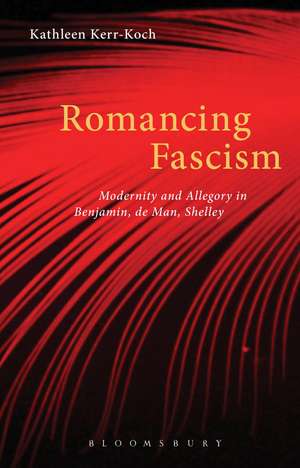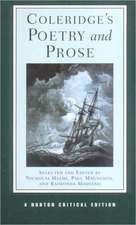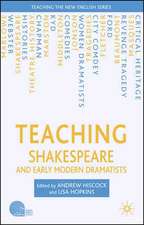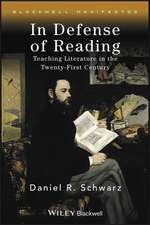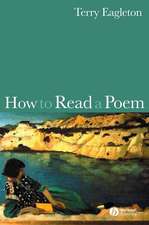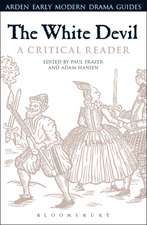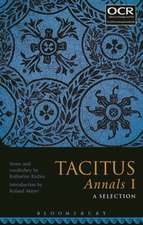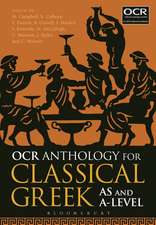Romancing Fascism: Modernity and Allegory in Benjamin, de Man, Shelley
Autor Dr. Kathleen Kerr-Kochen Limba Engleză Paperback – 22 oct 2014
| Toate formatele și edițiile | Preț | Express |
|---|---|---|
| Paperback (1) | 256.77 lei 6-8 săpt. | |
| Bloomsbury Publishing – 22 oct 2014 | 256.77 lei 6-8 săpt. | |
| Hardback (1) | 773.39 lei 6-8 săpt. | |
| Bloomsbury Publishing – 5 iun 2013 | 773.39 lei 6-8 săpt. |
Preț: 256.77 lei
Preț vechi: 295.02 lei
-13% Nou
Puncte Express: 385
Preț estimativ în valută:
49.13€ • 51.30$ • 40.66£
49.13€ • 51.30$ • 40.66£
Carte tipărită la comandă
Livrare economică 04-18 aprilie
Preluare comenzi: 021 569.72.76
Specificații
ISBN-13: 9781628925272
ISBN-10: 1628925272
Pagini: 240
Dimensiuni: 152 x 229 x 13 mm
Greutate: 0.33 kg
Editura: Bloomsbury Publishing
Colecția Bloomsbury Academic
Locul publicării:New York, United States
ISBN-10: 1628925272
Pagini: 240
Dimensiuni: 152 x 229 x 13 mm
Greutate: 0.33 kg
Editura: Bloomsbury Publishing
Colecția Bloomsbury Academic
Locul publicării:New York, United States
Caracteristici
Explores the crucial question of intellectual responsibility as it relates to critical inquiry
Notă biografică
Kathleen Kerr-Koch is Senior Lecturer in Literary History and Literary Theory at the University of Sunderland, UK. She has published articles on Paul de Man, Walter Benjamin, Theodor Adorno, Julia Kristeva, Barbara Herrnstien-Smith, Noam Chomsky, Herbert Marcuse, Christopher Norris, A.J. Greimas, Hans R. Jauss and Barbara Ehrenreich as well as essays on modernity, autobiography and race, nation and ethnicity. She has also been a Visiting Lecturer at Delhi University, India.
Cuprins
Acknowledgements List of Figures Preface Chapter 1: Introduction - Critical Limits and Allegorical Contagion Chapter 2: From Vitalism to the Traumatised Angel of History: Walter Benjamin Chapter 3: From Inwardness to Allegories of Reference: Paul de Man Chapter 4: How to do Things with Allegory: Percy Bysshe Shelley Chapter 5: Conclusions: Criticism as Enlightened Deconstruction Endnotes Bibliography Index
Recenzii
Kerr-Koch's thoroughly researched and densely argued study analyses the uses of allegory in... three (apparently) disparate writers. Kerr-Koch boldly attempts the rehabilitation of de Man, so drastically fallen from critical-theoretical favour, in the context of an examination of the positive resistant potential of allegory in the contemporary world.
Kathleen Kerr-Koch has here devised an original and highly revealing constellation of three writers - Shelley, Benjamin, and de Man - whose work she shows, through careful and perceptive close-reading, to speak very directly to crucial issues in present-day literary and cultural theory. Above all she brings out their critical power, when conjoined in this way, to focus and refine our thinking about the reception-history of poetic and philosophical texts and, beyond that, their potential impact on the course of historical events. This involves a subtly inflected understanding of the structure and workings of allegory as theorised and exemplified in the work of her chosen authors. Kerr-Koch also demonstrates how wide of the mark, naïve and ideologically suspect are those other, less scrupulous readings that take for granted a simplified model of intellectual history and a grossly reductive or distorting view of the 'influences' active in current (usually deprecated) movements of thought. This book is a fine achievement and should remind us what is politically at stake when well-placed conservative antagonists of 'theory' - and of deconstruction in particular - take it as their stalking-horse for an overt or covert attack on the project and values of enlightened critique.
Kathleen Kerr-Koch has here devised an original and highly revealing constellation of three writers - Shelley, Benjamin, and de Man - whose work she shows, through careful and perceptive close-reading, to speak very directly to crucial issues in present-day literary and cultural theory. Above all she brings out their critical power, when conjoined in this way, to focus and refine our thinking about the reception-history of poetic and philosophical texts and, beyond that, their potential impact on the course of historical events. This involves a subtly inflected understanding of the structure and workings of allegory as theorised and exemplified in the work of her chosen authors. Kerr-Koch also demonstrates how wide of the mark, naïve and ideologically suspect are those other, less scrupulous readings that take for granted a simplified model of intellectual history and a grossly reductive or distorting view of the 'influences' active in current (usually deprecated) movements of thought. This book is a fine achievement and should remind us what is politically at stake when well-placed conservative antagonists of 'theory' - and of deconstruction in particular - take it as their stalking-horse for an overt or covert attack on the project and values of enlightened critique.
